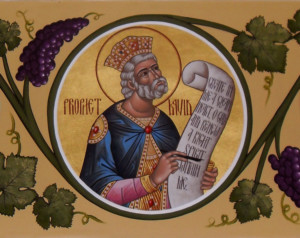Psalm 1

Blessed is the man who walks not in the counsel of the ungodly. These words start the book of Psalms. In the words of St Nicodemus the Hagiorite, “It contains a blessing and praise of the pious and righteous, but for the impious and sinful is condemnation and unhappiness.”
St Athanasius the Great says that David the prophet and king devotes this first Psalm to Christ, who was anticipated to be born from his lineage. He alone can be considered blessed because he was outside of all of the death and corruption of sin. Through this psalm, however, we gain further insight into what we should do in order to imitate Christ and avoid the “way of sinners” and the “seat of the troublesome.”
It teaches us to conform our will to that of God so that the virtues – the fruits of the Holy Spirit – might take root in us. In this manner we may become fruit bearing trees (verse 3), which are nourished by the “living water” of Christ’s teaching. On the other hand, the ungodly (verse 4) do not bear fruit or draw near to Christ but are like the chaff “which the wind drives away.”
Furthermore, when stating that the ungodly shall not rise up with the righteous, the Greek word used also means “resurrect.” This highlights an important aspect of this psalm in that it does not just look to the present or to our temporary earthly life, but also to the eternal where the ungodly shall not inherit the Kingdom of God, nor shall the sinful stand in the “congregation of the righteous” – which we can understand to mean the Church.
In the final verse, David makes clear that no man is able to escape God’s notice and hide from Him. To quote St Nicodemus, “The virtues and deeds of the righteous and holy people will remain forever as their wealth and crown. The sins and deeds of the evil and impious … are destroyed and become ineffective.”
Source: Lychnos June-July 2020 edition
